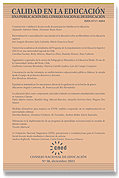Development and Validation of a Family Participation Scale for School Education
DOI:
https://doi.org/10.31619/caledu.n59.1365Keywords:
school participation, family involvement, primary education, content validity, construct validity, exploratory factorial analysisAbstract
This article presents the creation and validation of a scale designed to measure family participation in school education. Recent research has highlighted the challenges that schools face in establishing effective relationships between families and the educational institution, often resulting in low engagement and ineffective communication. Furthermore, the absence of valid tools for assessing family participation and guiding interventions in this domain has been identified. A set of indicators categorized into three dimensions has been developed: support in education from home, democratic participation, and communication with the school, drawing from various models of family participation. These indicators underwent content validity evaluation with input from thirteen academic experts. Subsequently, the instrument was applied to a sample of 308 parents from a public school to assess its reliability and construct validity. The results indicate that the scale is suitable for use in the context of primary education in Chile and aligns with the initial theoretical framework, rendering it ready for application in the context of Chilean primary education.
Downloads
Published
Issue
Section
License
Copyright (c) 2023 Calidad en la Educación

This work is licensed under a Creative Commons Attribution 4.0 International License.
Authors retain their Copyright and only transfer a part of these to the journal, accepting the following conditions:
Authors keep their rights as authors and guarantee the right to the journal for the first publication of their work, which is simultaneously subject to the Creative Commons Attribution license allowing third parties to share the study accrediting the author and first publication in this journal.
Authors may adopt other non-exclusive license agreements for distribution of the version of the published work (e.g. inclusion in an institutional thematic file or publication in a monographic volume) accrediting initial publication in this journal.
Authors are allowed and recommended to share their work over the Internet (e.g. in institutional telematic files or their website) before and during the submission process, which may lead to interesting exchanges and increased citation of the published work. (See The effect of open access).

